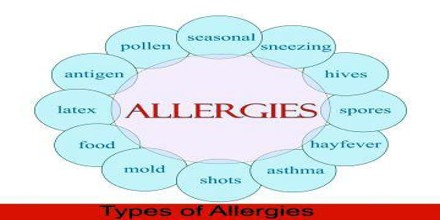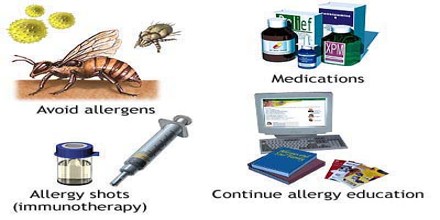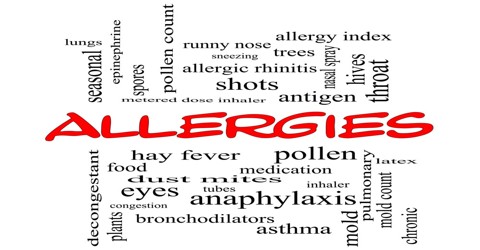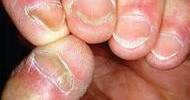Types and Treatment of Allergy
Introduction
Allergies occur when our immune system reacts to a foreign substance — such as pollen, bee venom or pet dander — or to a food that doesn’t cause a reaction in most people. Our immune system produces substances known as antibodies. When we have allergies, our immune system makes antibodies that identify a particular allergen as harmful, even though it isn’t. When we come into contact with the allergen, our immune system’s reaction can inflame our skin, sinuses, airways or digestive system.

Risk factors for allergy can be placed in two general categories, namely host and environmental factors. Host factors include heredity, sex, race, and age, with heredity being by far the most significant. However, there have been recent increases in the incidence of allergic disorders that cannot be explained by genetic factors alone. Four major environmental candidates are alterations in exposure to infectious diseases during early childhood, environmental pollution, allergen levels, and dietary changes.
Types of Allergy
The types of allergies including food allergies, seasonal allergies, pet allergies, and many more.

Respiratory Allergies –
- Summer Allergies: Summer allergies are usually triggered by pollen from grasses and weeds.
- Fall Allergies: Ragweed, mold and dust mites are the biggest allergy triggers in the fall.
- Winter Allergies: If we have indoor allergies such as mold and dust mites, we may notice symptoms more during winter, when we spend more time inside.
- Hay Fever: Hay fever, also known as allergic rhinitis, is an immune disorder characterized by an allergic response to pollen grains and other substances. There are two types: seasonal, which occurs only during the time of year in which certain plants pollinate, and perennial, which occurs year-round.
- Pollen Allergies: More than 25 million Americans are allergic to pollen from trees, grass, or weeds.
- Mold Allergy: All of us are exposed to some mold every day, and usually, there are no problems. But if we have allergies to it, we can have a reaction if you’re around too much of it.
- Dust Allergy: For creatures we can’t even see, dust mites can stir up a lot of trouble.
Food Allergies –
Food allergies or food intolerances affect nearly everyone at some point. People often have an unpleasant reaction to something they ate and wonder if they have a food allergy.
Genetics Allergies –
Allergic diseases are strongly familial: identical twins are likely to have the same allergic diseases about 70% of the time; the same allergy occurs about 40% of the time in non-identical twins. Allergic parents are more likely to have allergic children, and those children’s allergies are likely to be more severe than those in children of non-allergic parents.
Other Environmental Factors
International differences have been associated with the number of individuals within a population have allergy. Allergic diseases are more common in industrialized countries than in countries that are more traditional or agricultural, and there is a higher rate of allergic disease in urban populations versus rural populations, although these differences are becoming less defined.

Treatment and Prevention
Allergy treatments are include:
Allergen Avoidance – Doctor will help us take steps to identify and avoid our allergy triggers. This is generally the most important step in preventing allergic reactions and reducing symptoms.
Medications – Depending on our allergy, medications can help reduce our immune system reaction and ease symptoms. Doctor may suggest over-the-counter or prescription medication in the form of pills or liquid, nasal sprays or eyedrops.
Immunotherapy – For severe allergies or allergies not completely relieved by other treatment, doctor may recommend allergen immunotherapy. This treatment involves a series of injections of purified allergen extracts, usually given over a period of a few years.
Emergency Epinephrine – If we have a severe allergy, doctor may give us an emergency epinephrine shot to carry with us at all times. Given for severe allergic reactions, an epinephrine shot (EpiPen, others) can reduce symptoms until we get emergency treatment.
Some foods during pregnancy have been linked to allergies in the child. Vegetable oil, nuts and fast food may increase the risk while fruits, vegetables and fish may decrease it. Another review found no effect of eating fish during pregnancy on allergy risk.
Probiotic supplements taken during pregnancy or infancy may help to prevent atopic dermatitis.
















